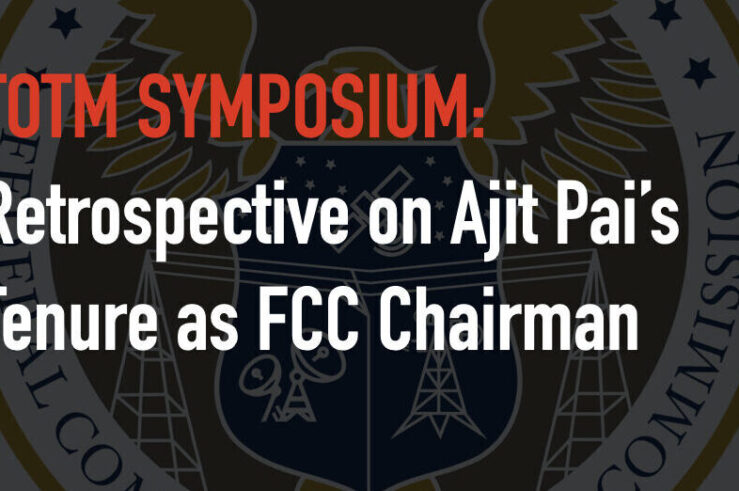Showing archive for: “US Constitution”
Congress Should Not Legalize a News Media Cartel
Amazingly enough, at a time when legislative proposals for new antitrust restrictions are rapidly multiplying—see the Competition and Antitrust Law Enforcement Reform Act (CALERA), for example—Congress simultaneously is seriously considering granting antitrust immunity to a price-fixing cartel among members of the newsmedia. This would thereby authorize what the late Justice Antonin Scalia termed “the supreme ... Congress Should Not Legalize a News Media Cartel
The NCAA: Dr Jekyll or Mr Hyde?
The U.S. Supreme Court will hear a challenge next month to the 9th U.S. Circuit Court of Appeals’ 2020 decision in NCAA v. Alston. Alston affirmed a district court decision that enjoined the National Collegiate Athletic Association (NCAA) from enforcing rules that restrict the education-related benefits its member institutions may offer students who play Football ... The NCAA: Dr Jekyll or Mr Hyde?
Chairman Pai Symposium: Wrap-Up and Thoughts for the Future FCC
One of the themes that has run throughout this symposium has been that, throughout his tenure as both a commissioner and as chairman, Ajit Pai has brought consistency and careful analysis to the Federal Communications Commission (McDowell, Wright). The reflections offered by the various authors in this symposium make one thing clear: the next administration ... Chairman Pai Symposium: Wrap-Up and Thoughts for the Future FCC
Pai Dedicated His Tenure to Improving US Broadband
Ajit Pai came into the Federal Communications Commission chairmanship with a single priority: to improve the coverage, cost, and competitiveness of U.S. broadband for the benefit of consumers. The 5G Fast Plan, the formation of the Broadband Deployment Advisory Committee, the large spectrum auctions, and other broadband infrastructure initiatives over the past four years have ... Pai Dedicated His Tenure to Improving US Broadband
The Forgotten Strand of the Anti-Monopoly Tradition in Anglo-American Law
Admirers of the late Supreme Court Justice Louis Brandeis and other antitrust populists often trace the history of American anti-monopoly sentiments from the Founding Era through the Progressive Era’s passage of laws to fight the scourge of 19th century monopolists. For example, Matt Stoller of the American Economic Liberties Project, both in his book Goliath ... The Forgotten Strand of the Anti-Monopoly Tradition in Anglo-American Law
Conflict of Interest in Prosecuting Police Officers: Examining the Incentives Facing District Attorneys
High-profile cases like those of Michael Brown in Ferguson, Missouri, and Breonna Taylor in Louisville, Kentucky, have garnered attention from the media and the academy alike about decisions by grand juries not to charge police officers with homicide. While much of this focus centers on alleged racial bias on the part of police officers and ... Conflict of Interest in Prosecuting Police Officers: Examining the Incentives Facing District Attorneys
The Dishonesty of Conservative Attacks on Section 230
President Donald Trump has repeatedly called for repeal of Section 230. But while Trump and fellow conservatives decry Big Tech companies for their alleged anti-conservative bias, including at yet more recent hearings, their issue is not actually with Section 230. It’s with the First Amendment. Conservatives can’t actually do anything directly about how social media ... The Dishonesty of Conservative Attacks on Section 230
Conservatism and the Section 230 Debate: Applying First Principles
Over at the Federalist Society’s blog, there has been an ongoing debate about what to do about Section 230. While there has long-been variety in what we call conservatism in the United States, the most prominent strains have agreed on at least the following: Constitutionally limited government, free markets, and prudence in policy-making. You would ... Conservatism and the Section 230 Debate: Applying First Principles
A Law & Economics Perspective on Ruth Bader Ginsburg
With the passing of Justice Ruth Bader Ginsburg, many have already noted her impact on the law as an advocate for gender equality and women’s rights, her importance as a role model for women, and her civility. Indeed, a key piece of her legacy is that she was a jurist in the classic sense of ... A Law & Economics Perspective on Ruth Bader Ginsburg
In the Fight Against Qualcomm, Apple’s Loss is Apple’s Gain
Apple’s legal team will be relieved that “you reap what you sow” is just a proverb. After a long-running antitrust battle against Qualcomm unsurprisingly ended in failure, Apple now faces antitrust accusations of its own (most notably from Epic Games). Somewhat paradoxically, this turn of events might cause Apple to see its previous defeat in ... In the Fight Against Qualcomm, Apple’s Loss is Apple’s Gain
How does antitrust measure nonprice effects like political bias?
In the latest congressional hearing, purportedly analyzing Google’s “stacking the deck” in the online advertising marketplace, much of the opening statement and questioning by Senator Mike Lee and later questioning by Senator Josh Hawley focused on an episode of alleged anti-conservative bias by Google in threatening to demonetize The Federalist, a conservative publisher, unless they ... How does antitrust measure nonprice effects like political bias?
Will Montesquieu Rescue Antitrust?
In an age of antitrust populism on both ends of the political spectrum, federal and state regulators face considerable pressure to deploy the antitrust laws against firms that have dominant market shares. Yet federal case law makes clear that merely winning the race for a market is an insufficient basis for antitrust liability. Rather, any ... Will Montesquieu Rescue Antitrust?








